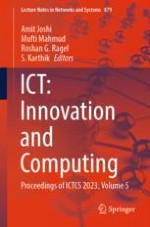2024 | OriginalPaper | Buchkapitel
An Electricity Theft Cyber-Attacks’ Detection System for Future IoT-Based Smart Electric Meters in Renewable Distributed Generation
verfasst von : Kunal Solanki, Shoyab Ali
Erschienen in: ICT: Innovation and Computing
Verlag: Springer Nature Singapore
Aktivieren Sie unsere intelligente Suche, um passende Fachinhalte oder Patente zu finden.
Wählen Sie Textabschnitte aus um mit Künstlicher Intelligenz passenden Patente zu finden. powered by
Markieren Sie Textabschnitte, um KI-gestützt weitere passende Inhalte zu finden. powered by
